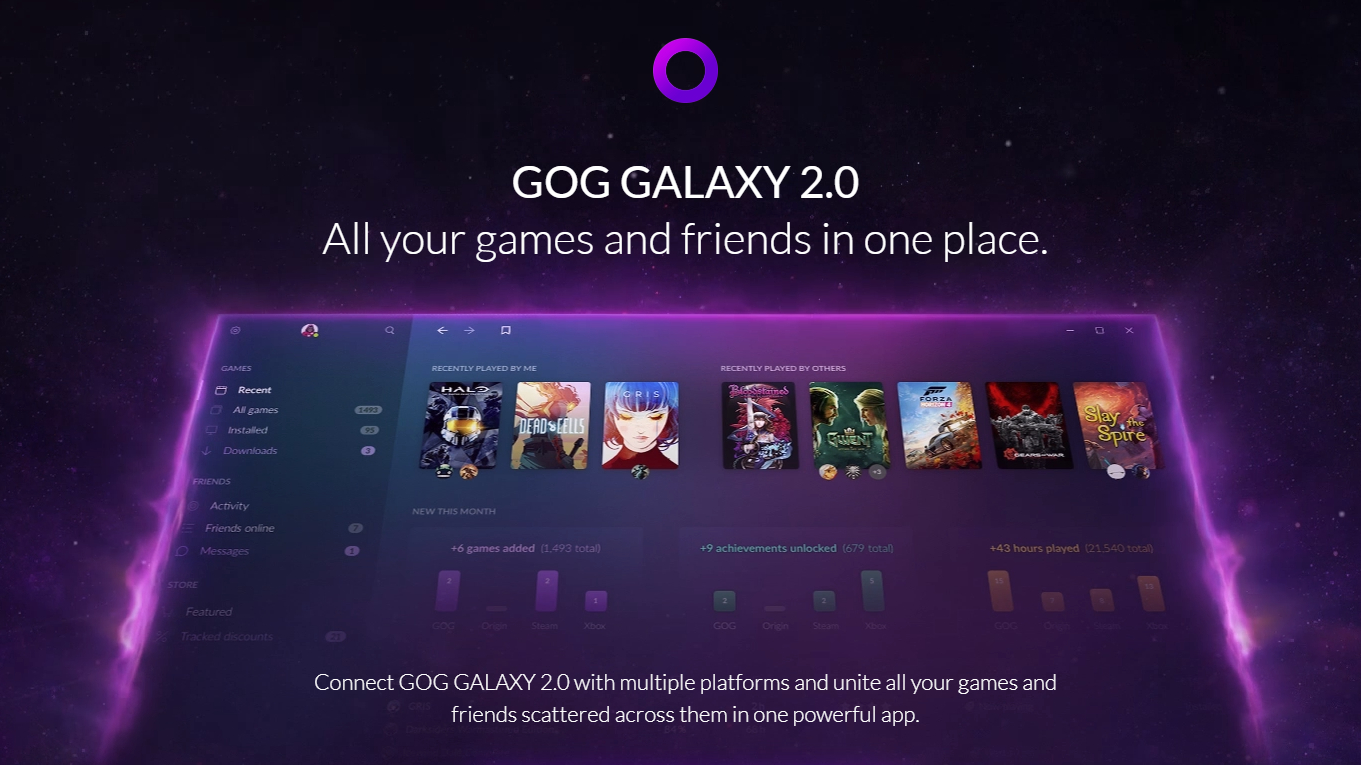GOG Galaxy 2.0 is an all-in-one hub that brings together PC and console gamers
Epic idea with plenty of Steam?

A revamped version of GOG’s desktop client is trying something new by turning the platform into an all-in-one hub where you can keep all your games and friends seamlessly together, across not just different PC games stores, but also console offerings.
GOG Galaxy 2.0 is on the verge of a closed beta, and you can think of it as an overarching game management app where you can import all your titles from not just PC digital distribution outlets – whether that’s Steam, Epic, and so on – but also console platforms.
- Epic Games Store sale could steal Steam’s thunder
- The best PC games of 2019
- Steam vs GOG vs GreenManGaming: which is best for PC gamers?
Galaxy then keeps track of all your game stats and achievements (as well as leaderboards) across all those titles, and acts as a game launcher for PC titles (but obviously not console games – you will, strangely enough, need to be on your console to play those).
Perhaps more importantly, the idea is to connect all your friends across these disparate gaming portals, and to facilitate messaging (and eventually cross-platform chat), and more easily finding existing friends on different platforms where you’ve not yet friended them, plus of course new friends.
Eventually, the idea will be to highlight interesting games which are on the horizon, and to discover games which are popular or trending among your friends or indeed the broader community.
The interface of Galaxy 2.0 will also allow for a good deal of user customization, with plenty of configuration options with menus, as Gamespot reports, and the ability to tweak things like the art associated with the games displayed in the client.
Galaxy of the guardians
In the FAQ for the new project, GOG notes: “We want to offer integrations with all possible gaming platforms. This is a challenging and time-consuming process, not only because these are technically complex projects, but they also require negotiations and agreements with partners. We want all our official integrations to be supported by respective platform holders, so we make sure they’re in-line with partners’ policies and that they’re safe.”
Sign up for breaking news, reviews, opinion, top tech deals, and more.
However, the firm will give gamers themselves the opportunity to add their own open source integrations, too. The FAQ further states: “While we’re hard at work on adding more official integrations, we’ve decided to give you – the community – an opportunity to work on your own open source platform integrations. We’re currently polishing the documentation that will be shared with you to help you build your own platform integrations for GOG Galaxy 2.0.”
GOG is unsurprisingly making it clear that it isn’t looking to be hoovering up data on your PC gaming habits when it comes to Galaxy 2.0.
The website makes it clear that: “We’ll never share your personal data with third parties.” And that you’ll also be able to remove any of your data from the GOG servers very easily (with a single mouse click, apparently).
On the subject of whether the Galaxy client will ‘spy’ on the user’s PC, the aforementioned FAQ clarifies: “No. We’re not in the business of users’ data. GOG Galaxy 2.0 is only importing information from connected platforms – you always know what is imported through official integrations. Additionally we’ve made the community created integrations open-source, to ensure the transparency of imported data.”
So there you have it, and GOG’s word is likely to be more trusted by many, given the company’s firm DRM-free stance, for example, and the fact that the Galaxy client is entirely optional.
If you don’t want to install the client, you don’t have to – you can stick to the GOG website and purchase your games there, with no worries whatsoever. But obviously, GOG is hoping that by making Galaxy 2.0 an overarching gaming companion with a strong emphasis on social connection (including cross-platform), it’ll tempt far more folks to give it a whirl.
Closed beta testing of Galaxy 2.0 should begin soon, and those with a GOG account can sign up here to get a chance at being part of the initial group of testers.
- Play your GOG (or other) games on one of our best gaming PCs
Darren is a freelancer writing news and features for TechRadar (and occasionally T3) across a broad range of computing topics including CPUs, GPUs, various other hardware, VPNs, antivirus and more. He has written about tech for the best part of three decades, and writes books in his spare time (his debut novel - 'I Know What You Did Last Supper' - was published by Hachette UK in 2013).